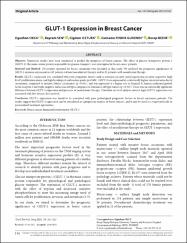| dc.contributor.author | Okcu, Oğuzhan | |
| dc.contributor.author | Şen, Bayram | |
| dc.contributor.author | Öztürk, Çiğdem | |
| dc.contributor.author | Güvendi, Gülname Fındık | |
| dc.contributor.author | Bedir, Recep | |
| dc.date.accessioned | 2023-01-11T06:53:17Z | |
| dc.date.available | 2023-01-11T06:53:17Z | |
| dc.date.issued | 2022 | en_US |
| dc.identifier.citation | Okcu, O., Sen, B., Ozturk, C., Guvendi, G. F., & Bedir, R. (2022). GLUT-1 Expression in Breast Cancer. GLUT-1 Expression in Breast Cancer. Turk patoloji dergisi, 38(2), 114–121. https://doi.org/10.5146/tjpath.2021.01557 | en_US |
| dc.identifier.issn | 1018-5615 | |
| dc.identifier.uri | https://doi.org/10.5146/tjpath.2021.01557 | |
| dc.identifier.uri | https://hdl.handle.net/11436/7397 | |
| dc.description.abstract | Objective: Numerous studies have been conducted to predict the prognosis of breast cancers. The effect of glucose transporter protein 1 (GLUT-1), the main carrier protein responsible for glucose transport, was investigated in breast cancer patients. Material and Method: 170 patients operated for breast carcinoma were included in this study. We analysed the prognostic significance of GLUT-1 immune-expression in 149 patients without neoadjuvant therapy, and in 21 patients with neoadjuvant therapy. Results: GLUT-1 expression was correlated with poor prognostic factors such as estrogen receptor and progesterone receptor negativity, high Ki-67 proliferation index, and high histological and nuclear grade (p<0.001). GLUT-1 was expressed at a statistically higher rate in invasive ductal carcinomas, compared to invasive lobular carcinomas (p <0.001), and was expressed at a higher rate in luminal B, human epidermal growth factor receptor 2 and triple-negative molecular subtypes compared to luminal A subtype tumors (p <0.001). There was no statistically significant difference between GLUT-1 expression and presence of neoadjuvant therapy. Univariate survival analysis showed high GLUT1 expression was associated with low disease-free survival. Conclusion: GLUT-1 expression was found to be associated with poor pathological prognostic factors in breast carcinoma patients. The results suggest that GLUT-1 expression can be considered as a prognostic marker in breast cancers, and it may be used as a target molecule in personalized treatment approaches. | en_US |
| dc.language.iso | eng | en_US |
| dc.publisher | Federation of Turkish Pathology Societies | en_US |
| dc.rights | info:eu-repo/semantics/openAccess | en_US |
| dc.subject | Breast cancer | en_US |
| dc.subject | GLUT-1 | en_US |
| dc.subject | Immunohistochemistry | en_US |
| dc.title | GLUT-1 expression in breast cancer | en_US |
| dc.type | article | en_US |
| dc.contributor.department | RTEÜ, Tıp Fakültesi, Cerrahi Tıp Bilimleri Bölümü | en_US |
| dc.contributor.institutionauthor | Okcu, Oğuzhan | |
| dc.contributor.institutionauthor | Şen, Bayram | |
| dc.contributor.institutionauthor | Öztürk, Çiğdem | |
| dc.contributor.institutionauthor | Güvendi, Gülname Fındık | |
| dc.contributor.institutionauthor | Bedir, Recep | |
| dc.identifier.doi | 10.5146/tjpath.2021.01557 | en_US |
| dc.identifier.volume | 38 | en_US |
| dc.identifier.issue | 2 | en_US |
| dc.identifier.startpage | 114 | en_US |
| dc.identifier.endpage | 121 | en_US |
| dc.relation.journal | Türk Patoloji Dergisi | en_US |
| dc.relation.publicationcategory | Makale - Uluslararası Hakemli Dergi - Kurum Öğretim Elemanı | en_US |


















